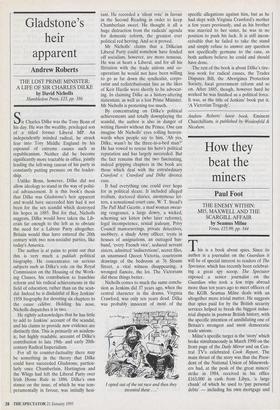Gladstone's heir apparent
Andrew Roberts
THE LOST PRIME MINISTER: A LIFE OF SIR CHARLES DILKE by David Nicholls Hambledon Press, £25, pp. 386 Sir Charles Dilke was the Tony Benn of his day. He was the wealthy, privileged son of a titled former Liberal MP. An independently minded radical, he struck fear into Tory Middle England by his espousal of extreme causes such as republicanism. Neither did he become significantly more tractable in office, jointly leading the left-wing caucus of his party in constantly putting pressure on the leader- ship.
Unlike Benn, however, Dilke did not allow ideology to stand in the way of politi- cal advancement. It is this book's thesis that Dilke was Gladstone's heir apparent and would have succeeded him had it not been for the sex scandal which destroyed his hopes in 1885. But for that, Nicholls suggests, Dilke would have taken the Lib- erals far enough to the left as to obviate the need for a Labour Party altogether. Britain would thus have entered the 20th century with two non-socialist parties, like today's America.
The author is at pains to point out that this is very much a pukkah political biography. He concentrates on serious subjects such as Dilke's role on the Royal Commission on the Housing of the Work- ing Classes, his contribution to franchise reform and his radical achievements in the field of education, rather than on the scan- dal. Indeed he is disdainful of Roy Jenkins' 1958 biography for devoting six chapters to the cause célebre. Holding his nose, Nicholls dispatches it in two.
He rightly acknowledges that he has little to add to Jenkins' account of the scandal, and his claims to provide new evidence are distinctly thin. This is primarily an academ- ic, but highly readable, account of Dilke's contribution to late 19th- and early 20th- century Radical Imperialism.
For all its counter-factuality there may be something in the theory that Dilke could have succeeded Gladstone, particu- larly once Chamberlain, Hartington and the Whigs had left the Liberal Party over Irish Home Rule in 1886. Dilke's own stance on the issue, of which he was tem- peramentally in favour, was initially hesi- tant. He recorded a 'silent vote' in favour in the Second Reading in order to keep Chamberlain sweet. He thought it all a huge distraction from the radicals' agenda for domestic reform, the greatest ever political red herring. And so it proved.
Mr Nicholls' claims that a Dilkeian Liberal Party could somehow have fended off socialism, however, are more tenuous. He was at heart a Liberal, and for all his flirtation with the trade unions and co- operatism he would not have been willing to go as far down the syndicalist, corpo- ratist and redistributionist line as the likes of Keir Hardie were shortly to be advocat- ing. In claiming Dilke as a history-altering statesman, as well as a lost Prime Minister, Mr Nicholls is protesting too much.
By concentrating on Dilke's political achievements and totally downplaying the scandal, the author is also in danger of writing Hamlet without the Prince. One can imagine Mr Nicholls' eyes rolling heaven- wards when people say to him, `Ah yes, Dilke, wasn't he the three-in-a-bed man?' He has vowed to rescue his hero's political reputation and has largely succeeded. But the fact remains that the two fascinating, indeed gripping chapters in the book are those which deal with the extraordinary Crawford v. Crawford and Dilke divorce case.
It had everything one could ever hope for in political sleaze. It included alleged troilism, doctored diaries, anonymous let- ters, a sensational court case, W. T. Stead's The Pall Mall Gazette, a mad woman swear- ing vengeance, a large dowry, a wicked, scheming sex kitten (who later reforms), legal incompetence, sexual jealousy, Privy Council manoeuvrings, private detectives, snobbery, a shady Army officer, trysts in houses of assignations, an outraged hus- band, 'every French vice', seduced servant sisters, admitted 'indiscretions', secret files, an unamused Queen Victoria, courtroom drawings of the bedroom at 76 Sloane Street, a vital witness disappearing, a wronged fiancée, the lot. The Victorians did these things better.
Nicholls comes to much the same conclu- sion as Jenkins did 37 years ago, when the central character in the drama, Virginia Crawford, was only ten years dead. Dilke was probably innocent of most of the I opted out of the rat race and then they invented these . . specific allegations against him, but as he had slept with Virginia Crawford's mother a few years previously, and as his brother was married to her sister, he was in no position to push his luck. It is still incon- ceivable that he failed to take the stand and simply refuse to answer any question not specifically germane to the case, as both authors believe he could and should have done.
The rest of the book is about Dilke's tire- less work for radical causes, the Trades Disputes Bill, the Aborigines Protection Society, local government reform and so on. After 1885, though, however hard he worked he was finished as a political force. It was, as the title of Jenkins' book put it, `A Victorian Tragedy'.
Andrew Roberts' latest book, Eminent Churchillians, is published by Weidenfeld & Nicolson.


























































 Previous page
Previous page